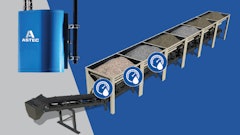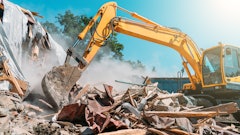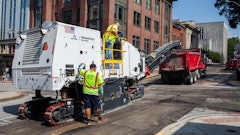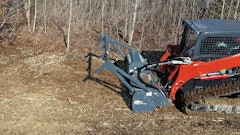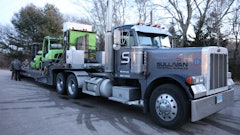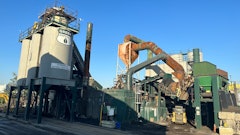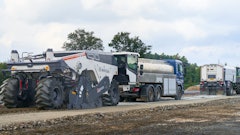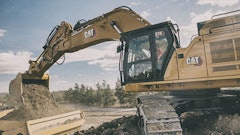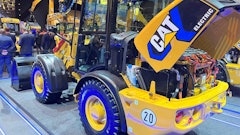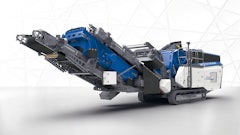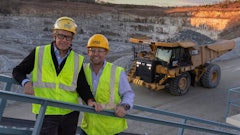
Crutchall Resource Recycling is more than just a dumpster company: they're turning trash into treasure; specifically, black gold. Crutchall Resource Recycling, who opened its doors in July 2007, has a keen eye for the reusable. During their first year of operation, they witnessed first-hand the incredible amount of recyclable material that was being discarded as waste, specifically high-value material such as roofing shingles.
Recent data suggests that nearly 11 million tons of asphalt roofing shingle wastes are produced in the United States each year. Recycling shingles can recapture the equivalent of 2 barrels of oil from every ton of shingles recycled.
In 2008, Crutchall began extracting asphalt roofing shingles from the waste stream and reconstituting them as a hot-mix asphalt supplement, thus saving valuable landfill space and creating a market for the recycled material. They utilize one of Bandit Industries' Beast Recyclers, equipped with the optional Shingle Grinding Package, to process the material.
Elly Kane and Matt Teesdale of Crutchall Resource Recycling spoke with Jerry Morey, president of Bandit Industries, Inc., to discuss the success they've had in their shingle-grinding venture. During this interview, Kane and Teesdale explain the need for shingle recycling, and potential growth for the industry.
Jerry Morey: Tell us a little about what you are doing, what you have done, and what you are planning to do.
Ellie Kane: "As you know, we started out as a dumpster company. As we were going to the landfills, we were seeing that shingles were being disposed of right along with all the other trash. We really thought that something different needed to be done. We started researching, and discovered that shingles in some other states were being pulled out of the landfill, sorted, cleaned and recycled into hot mix asphalt. We started to pursue this venture for ourselves. We went to the DEQ and asked them to exempt shingles from the waste stream, which they did fairly quickly and easily. We got the ball rolling, and started collecting shingles with the contacts that we already had in Grand Rapids (Michigan). From there, we expanded to our Lansing, Kalamazoo, Flint and Warren sites. We did some research on the different grinders out there, as you know, and the Bandit came highly recommended."
JM: Describe the process of the collection.
Matt Teesdale: "The roofers will bring the shingles to us. We tend to cut their tipping fee in half for what they would have to pay at a landfill. We will test the sample of each load that comes in for the DEQ. Then we clean the shingles and stockpile them until we have enough to grind up for our finished product."
JM: What is involved in the cleaning process?
MT: "We take out the wood, plastic and nails from the roofing by hand."
EK: "I think it is important to mention something that Matt and the other yards do: when the roofers start to coming to us, we have a training period with that roofer to help them understand how they can save on their landfill dollars by keeping to the roofing material debris only. For example, not letting the homeowners throw old carpet, or the kids' swimming pool, into the dumpster helps to keep down on the sorting."
JM: You encourage people to sort for you.
MT: We will take all of the debris, but it helps if they put the roofing material on top so that we don't have to continuously dig through the pile ourselves and pick stuff out.
JM: So they don't have to go to two different sites with their debris?
MT: Right, and then we are able to do more with the leftover material. We recycle the steel and aluminum, but it's much easier if they separate it for us.
JM: What do you charge to dump?
MT: It depends on the area. In Grand Rapids, prices are different than Lansing and Flint.
EK: There are different reasons for prices being set. We look at what the landfill rates in the area are to give them motivation to come to our yard.
JM: Right, you give them a financial incentive to come to you.
EK: We look at the landfill tip fee. We try to structure our prices so they are going to save anywhere from 40% to 60% of their tip. How much they save is based on how well they do the job of bringing us only roof debris, and putting the non-shingled material on top of the load, so that the contractor willing to go that extra step to sort can save more money. The guy that doesn't want to bother sorting, but will keep the homeowner trash out, might only save 40%, and the guy that wants to throw in all the trash along with the shingles is only going to save 20%.
JM: Who do you sell the finished ground shingle product to?
EK: Currently, the exemption in the state of Michigan only allows it to be used for hot mix asphalt. We work with a couple different hot mix asphalt companies to utilize that product. We are looking into the possibility of selling it as an alternative fuel in the cement kilns. We are just in the beginning stages of talking with them.
JM: You mentioned that here in our state you are working with Michigan Paving.
EK: We have been selling most of products to Michigan Paving but we have begun talking with other companies as well. Michigan Paving has been using our product it in projects this summer. They have been very pleased with the results. They have a test site in Allegan County that they just did. We are also trying to work with Muskegon County Roads to do a joint venture with the County. That is in the very beginning stages. We have a lot of different things that are 'in the process'. I think it will be an exciting year next year.
JM: Regarding the oil content of the shingles: in used tear offs, what percentage of the ground shingles turns into an oil-based product?
EK: With shingles used in hot mix asphalt, the percentage is really low. Everything in the shingle can be used in the hot mix asphalt; nothing has to be sorted out. When the shingle is ground and brought down to a small enough grade, they are getting an asphalt content near 25%. At that rate, we can estimate that a ton of shingles can recapture the equivalent of about 2 barrels of oil.
I don't know how much you know about the refinery process, but when they refine crude oil, they heat it up. As they heat it up, it separates into different grades. They use the lighter grades for jet fuel, kerosene, gasoline, and fuel oils. The oil at the bottom of the barrel is used for asphalt. With the processes they are using now, they are able to actually crack the hydrocarbons of the asphalt-grade oil, and in the process, they can actually squeeze out more of those lighter grades. If I'm not mistaken, they used to use almost 1/3 of a barrel of oil for asphalt. Now they can bring crude oil to the point where they are barely getting any oil that is used for asphalt. They can refine almost all of it to a lighter grade.
JM: I heard recently that there is virtually no asphalt coming out of the Pacific Northwest.
EK: Right. Because there is such a great demand for the lighter grades. So now, they are not forced to supply it automatically. The supply is only what they choose to make, and that is part of what has really driven up the cost of asphalt. Last season, in January 2008, liquid asphalt was going for $289 a ton. It was over $800.00 a ton in September. The price has really been driven up, and part of that is because of the coakers and their ability to crack those hydrocarbons and make lighter grades. Of course, part of it was just what we saw with the crude oil pricing. Right now gasoline and oil prices have come down, but we are still going to see asphalt remain high because of the fact that the supply has decreased with their ability to crack it down to lighter grades. This is only going to increase. Even if oil prices drop, there will still be a great demand for recycled shingles for asphalt.
JM: Your approach is a wonderful one: going to the DEQ and having the guts to set the sites up. You had to start somewhere if you were going to get anywhere.
EK: Exactly. We really stuck our neck out there. It's still out there. We are trying to make changes and differences in the way things are done here in Michigan, and now we are going to the State to see if they will accept shingle waste as a cement kiln fuel. That will be another visit to the DEQ. At this time, that is not approved.
JM: I heard mention that you were possibly planning to expand into Indiana, and possibly Ohio. Can you tell us a little about that?
EK: We are certainly looking into Indiana. Indiana makes it a lot more attractive to do business there than Michigan. They have some really great programs, and they are very interested in us coming to town. They have pursued us to do this. It looks very realistic that we will head that direction. We are talking to Ohio as well.
JM: What are some of the incentives you are getting in Indiana that you are not in Michigan?
EK: For recycling, they have a variety of programs. As I understand it, for green projects and recycling initiatives, they will match you dollar for dollar on investment with a no interest, seven-year loan. If I buy a piece of equipment to use it down there, I obviously can't take it out of Indiana. With the Bandit being a mobile unit, I could only use it in Indiana if they help fund it. They give you money for seven years at no interest, which is certainly a gift. They are very generous. They also have some other grants available.
JM: How do you like your Bandit grinders?
EK: We are very pleased with them. They are producing a quality product.
MT: I agree. I haven't operated it, but I watch it run when we are at the yard. It's very easy to maintain.
JM: Generally how many tons of shingles do you grind per hour or per day?
MT: I think our best day was close to 400 tons. We are doing right around 70 to 75 ton per hour.
JM: What size is the end product you are trying to end up with?
MT: We are about 1/2" or less.
JM: Is that going directly into the hot mix?
MT: We grind into the gravel train trucks and they bring us the hot mix asphalt.
JM: What kind of percentage of shingles are they mixing with the asphalt?
MT: They are doing a 5% mix.
JM: All of this is going into parking lots and pathways?
MT: Yes.
EK: We need the DOT to write a spec so that it can be used in public roadways. They could decide to do a county project and make a county road with it, if they chose.
JM: Do you know of any of them that have done that?
EK: We are starting to talk to Muskegon County, and I know that Michigan Paving did some projects in Allegan County.
JM: Is the end-user that is working with Michigan Paving happy with the quality of asphalt-shingle supplemented pavement?
EK: Yes. In fact, we are one of the customers. Our pavement in our Lansing yard was laid with our product. I was there the day the hot-mix asphalt boys came over and were looking at it. We stood out there in the 90 degree heat, 'oohing' and 'aahing' over the parking lot. We had the Beast grinder running on that blacktop that they had laid, and even with that heat, it wasn't sinking into the pavement. That is a big heavy piece of equipment, vibrating away. It could have been sinking down, but it wasn't. That's one of the benefits of using recycled shingles in blacktop.
JM: You think it makes it tougher?
EK: Yes it does. That's why it is limited to using to only 5% shingle supplement. Usually 2 to 7% is kind of their limit, because it really thickens the pavement and makes it tougher to work with. But it produces a stronger road-a stiffer road-and that means you won't get the rutting and sinking from heavy traffic flow and high temperatures.
JM: Do you think it is because of the mix of the stone?
EK: Its because the asphalt is oxidized. It's not as soft as it would be with a liquid asphalt. That's the benefit. Now, there are projects that have been done with a higher content than the 5% we recommend. Matt and I just got back from Minnesota and Wisconsin. Minnesota has done some projects with 20%+, but for the most part, the industry sticks to that 5 to 7%.
JM: If I recall correctly, I once attended a conference that said Minnesota, Texas and South Carolina had approved up to a 5% mix of shingles in hot mix asphalt.
EK: I know that there are only 4 or 5 states that have tear offs approved and probably about a dozen that are using manufacturing waste and/or tear offs.
JM: We have a Beast running out east grinding tear offs, and they had a water floatation process that they separated everything with after the shingles were ground. It works pretty good: I know they were skimming the wood off the top, and they had a way of skimming even the aluminum nails out of there.
EK: We were just in Minnesota and Wisconsin and looking at other recyclers, and we got to see a Rotochopper run, and the product of hammermills and Peterson and Bandit. We certainly felt that our product with the Bandit Beast Recycler was one of the best. We really liked what we saw with the hammermill, but that is a different process and limits some of the usage, so it has its plusses and minuses. I heard from a few different sources that they really felt the Bandit was the best grind.
JM: We haven't had anybody buy a Bandit to grind shingles and go with another brand after they know how to run ours. All the major shingle grinders only run Bandits, and have run many of them. When they go to replace machines, they don't consider anything else. The big players are using ours. There are some people that think that they ought to go with a hammermill because maybe the teeth last longer but in the end, their operating costs are higher, the product is not as good, and they cant get as much for it.
EK: We are very pleased with the Bandit. We have had to work through some initial maintenance issues, but we are pleased with our product and have your support and service. We've been putting together a flyer with benefits of recycling shingles, and are talking with a couple of our senators, letting them know that shingles shouldn't be landfilled. They need to be recycled. They are too valuable of a resource.
It is important to note that when shingles are 100% recyclable. When shingles are recycled rather than landfilled, we conserve landfill growth, decrease our dependence on foreign oil, reuse previously mined aggregate, offer better private roads and parking lots, create new jobs, and generate revenue. Companies such as Crutchall Resource Recycling are doing their part to reduce landfill waste, as well as boosting the state's economy. Bandit Beast Recyclers are a proven method for breaking down shingle waste.
In addition to grinding services, Crutchall Resource Recycling offers consulting services for those wishing to set up shingle recycling facilities. They are eager to assist others with State Environmental Agencies, marketing, processes, and/or Departments of Transportation. They are located in Wyoming, MI and can be reached at (616) 241-5554.




